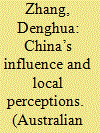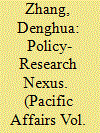|
|
|
Sort Order |
|
|
|
Items / Page
|
|
|
|
|
|
|
| Srl | Item |
| 1 |
ID:
154794


|
|
|
|
|
| Summary/Abstract |
China’s rise as a (re)emerging donor has attracted attention over the last decade, with a focus on Chinese development assistance as a challenge to the Organisation for Economic Cooperation and Development (OECD) aid norms. Knowledge of China’s domestic aid structure is needed to understand Chinese aid abroad. This paper addresses gaps in the literature and challenges the accepted nostrum that China’s Ministry of Commerce (MOFCOM) dominates China’s aid programme. Building on the authors’ experience as Chinese aid practitioners and scholars over more than a decade and drawing on over 300 interviews, the paper explores China’s aid decision-making processes by examining the main agencies, identities and informal interactions. We argue that the Chinese aid system is characterised by fierce and ongoing competition for influence among actors, especially MOFCOM, the Ministry of Foreign Affairs (MFA) and the Ministry of Finance (MoF), as well as the companies responsible for implementing Chinese aid projects.
|
|
|
|
|
|
|
|
|
|
|
|
|
|
|
|
| 2 |
ID:
187474


|
|
|
|
|
| Summary/Abstract |
Traditional powers have growing concerns about China’s influence in the Global South derived from its fast-growing outreach in the past two decades. However, how stakeholders in developing countries perceive China’s engagement and influence remains largely unknown. Drawing upon a survey of 210 participants and 30 follow-up interviews in the Pacific region with a focus on Papua New Guinea, Fiji and Tonga, this paper examines Pacific civil society stakeholders’ perceptions about China. It suggests that these perceptions are nuanced at best and reveals concerns about the Belt and Road Initiative, Chinese foreign aid and China-Pacific relations. It argues that China’s influence on Pacific civil society is weak, but this may be different in the political, government and business sectors. More similar research is required to develop a comprehensive understanding.
|
|
|
|
|
|
|
|
|
|
|
|
|
|
|
|
| 3 |
ID:
178279


|
|
|
|
|
| Summary/Abstract |
China has substantially increased its engagement with Pacific Island countries since 2006, driving heightened geostrategic competition between traditional powers and China in the region. Research on Pacific Island countries by Chinese scholars has grown rapidly in recent years, but this development and its relationship with policy needs are little-known outside China. By analyzing the 129 journal articles published by Chinese scholars on Pacific studies between 2006–2019, with supporting interviews, this research aims to expand the debate on the policy-research nexus, especially in the Chinese context, by introducing Pacific studies in China. It argues that official policy needs have largely shaped Pacific studies in China, and that researchers who seek to influence policy-making tend to find the process slow and indirect. This research will also improve our understanding of Chinese scholars’ intellectual support of China’s Pacific diplomacy on certain topics.
|
|
|
|
|
|
|
|
|
|
|
|
|
|
|
|
| 4 |
ID:
153725


|
|
|
|
|
| Summary/Abstract |
This article examines China's motivations for trilateral aid cooperation in the context of its seemingly assertive diplomacy in recent years. Previously known for its preference for bilateral aid delivery, China, however, is increasingly conducting trilateral cooperation with western donor states and UN agencies. By employing constructivism and cognitive learning theories, this paper focuses on two perspectives: China's calculation of national interests and international engagement, and is structured around two case studies: UNDP's advisory role for China on development cooperation, and China–US trilateral aid cooperation. It argues that strategically, China is putting growing emphasis on its identity as a growing great power in the development sector, using trilateral cooperation to build its global image. Technically, China's four-decade long external engagement has promoted changes in its ideas about aid cooperation, thus reinforcing its desire for cognitive learning to improve its aid performance.
|
|
|
|
|
|
|
|
|
|
|
|
|
|
|
|
|
|
|
|
|